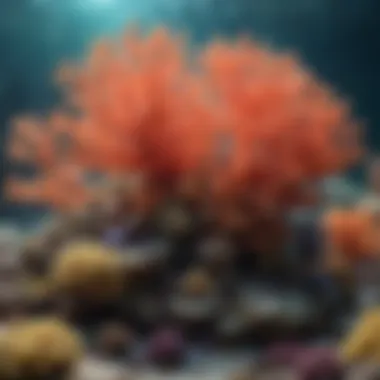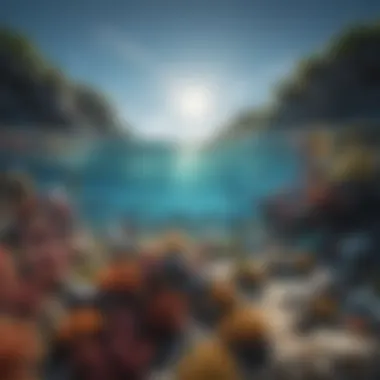Protecting Our Oceans: A Vital Necessity


Intro
The ocean covers more than 70% of Earth's surface, playing an essential role in sustaining life. It is a vast and complex ecosystem, home to millions of species. Yet, its health is often overlooked. Protecting the ocean is not just an environmental concern, but a fundamental necessity for biodiversity, climate stability, and human existence.
In the coming sections, this article will dive into various aspects of ocean protection. From the ecological significance of marine habitats to the socio-economic impacts on human communities, understanding these factors is crucial. Furthermore, current threats like pollution, overfishing, and climate change will be examined. This narrative will also present actionable strategies that can aid conservation efforts. Ultimately, we aim to convey that safeguarding oceanic health is paramount for sustaining life on this planet.
Research Overview
Summary of Key Findings
Recent studies highlight the critical importance of oceans in regulating the Earth's climate. The ocean absorbs approximately a quarter of the carbon dioxide emitted by human activities. This vital function mitigates climate change effects. Additionally, healthy ocean ecosystems are crucial for biodiversity, providing habitat and resources for countless species.
Marine biodiversity is intricately linked to the health of terrestrial ecosystems. For example, coral reefs are not just beautiful to look at; they support a variety of marine life and protect shorelines from erosion. Moreover, over 3 billion people depend on oceans for their livelihoods, primarily through fishing and tourism. Economic stability in many regions relies on healthy marine environments.
Importance of the Research
The significance of ocean protection extends beyond environmental concerns. As research substantiates, the health of marine ecosystems is directly connected to human well-being. This highlights the immediate need for sustainable practices. Failure to address threats could lead to irreversible damage, not only to marine life but also to human societies that depend on these resources.
Current Threats to the Ocean
- Pollution: Plastics, chemicals, and waste are polluting our oceans at alarming rates. This contamination impacts marine life and human health directly.
- Overfishing: Unsustainable fishing practices deplete fish populations, disrupting the oceanic food chain.
- Climate Change: Rising sea temperatures and ocean acidification threaten marine habitats, particularly coral reefs.
"Healthy oceans are critical for a sustainable future. Protecting them should be a priority for all nations."
Strategies for Conservation
Some actionable conservation strategies include:
- Implementing Sustainable Fishing Practices: Establishing quotas and protecting certain marine areas can help restore fish populations.
- Reducing Marine Pollution: Engaging communities in clean-up initiatives, stricter regulations on waste disposal, and promoting recycling can significantly lower ocean pollution.
- Education and Outreach: Increasing awareness about the importance of oceans can inspire collective action toward their protection.
In summary, protecting the ocean is not merely an ecological imperative. It is essential for maintaining biodiversity, stabilizing our climate, and supporting the livelihoods of millions. A concerted effort from individuals, communities, and governments is necessary to ensure a healthy ocean for future generations.
Preamble to Ocean Protection
The oceans cover more than 70% of the Earth's surface and are crucial to the planet's health. Protecting our oceans is not just an environmental concern; it encompasses economic, social, and cultural dimensions as well. In this article, we will discuss why ocean protection is imperative for maintaining biodiversity, climate stability, and human well-being.
Oceans serve multiple roles in our ecosystem. They are vital sources of food, recreation, and relaxation. Furthermore, they help regulate the climate and produce a significant portion of the world’s oxygen. However, they face increasing threats, such as pollution, overfishing, and climate change. These challenges underscore the need for effective strategies to protect oceanic health.
Protecting oceans is about ensuring sustainable practices that can support future generations. Initiatives such as establishing marine protected areas can enhance biodiversity. These areas allow ecosystems to thrive, providing refuge for countless marine species. Additionally, sustainable fishing practices are essential to prevent fish populations from collapsing, thereby ensuring food security for millions of people.
Furthermore, understanding ocean conservation strategies can empower local communities. Involving these communities in decision-making fosters a sense of responsibility and stewardship. The more communities are engaged, the more likely they are to adopt conservation practices.
Through conservation efforts, we preserve not only marine life but also the cultures and livelihoods intertwined with these ecosystems. The ocean is not just a resource; it is an integral part of human history and identity.
"Our oceans are a vital resource that provides half of the world’s oxygen and sustains innumerable species. Their protection is essential for a healthy planet."
In summary, the importance of ocean protection cannot be overstated. It requires collective action backed by scientific research, education, and policy changes. Throughout this article, we will delve deeper into various aspects of ocean protection, shedding light on the urgent need for a committed and unified approach to safeguarding our oceans.
The Role of Oceans in Global Ecosystems
Oceans play a critical role in maintaining the health of our planet. They cover more than 70% of the Earth's surface and are vital for numerous ecological processes. The oceans are not just vast bodies of water; they are complex ecosystems that support a diverse array of life forms. This section will articulate several essential functions of the oceans within global ecosystems, focusing on their contributions to biodiversity, the carbon cycle, and climate regulation.
Oceans as Biodiversity Havens
Oceans represent some of the most biodiverse environments on Earth. They host countless species, many of which are yet to be discovered. Coral reefs, for instance, are often called the "rainforests of the sea" due to their rich biodiversity. They provide habitat and food for a myriad of marine organisms.
- Habitat Diversity: From the deep sea to coastal wetlands, every zone of the ocean offers unique habitats. These varied environments are crucial for the life cycles of numerous species.
- Species Interdependence: The intricate relationships among species contribute to the resilience of these ecosystems. Predators, prey, and decomposers all play roles in maintaining balance within their habitats.
- Ecosystem Services: Oceans contribute significantly to human well-being by providing food, recreation, and resources. Fisheries, for example, are a source of protein for billions of people.
Protecting these biodiversity hotspots is essential. Loss of species can lead to cascading effects that undermine ecosystem stability. The preservation of marine biodiversity is not merely an environmental concern; it is pivotal for future food security and human health.
Oceans and the Carbon Cycle
The oceans are integral to the global carbon cycle, influencing climate regulation. They absorb a significant portion of carbon dioxide emitted into the atmosphere, which helps mitigate the effects of climate change.
- Carbon Sink: Oceans act as a large carbon sink. Phytoplankton, though tiny, play a huge role by photosynthesizing and absorbing CO2. This process not only removes carbon from the atmosphere but also produces oxygen.
- Oceanic Circulation: The movement of ocean currents helps distribute heat and influences weather patterns. This circulation is crucial for regulating global climate.
- Acidification Concerns: Increased levels of CO2 lead to ocean acidification, which can hinder the ability of marine organisms like corals and shellfish to build their structures. This disrupts the ecosystem and threatens biodiversity.


In summary, oceans are fundamental to the health of the planet. They support an array of life, play a pivotal role in carbon management, and regulate climate systems. Understanding these roles is a crucial step towards advocating for robust protections of our marine environments.
Economic Valuation of Oceans
Understanding the economic valuation of oceans is essential to grasp the full significance of their protection. Oceans are more than just large bodies of water; they provide numerous economic benefits that are critical to human survival and prosperity. By valuing the services that oceans offer, we can appreciate their contributions to global economies and craft informed policies for their protection. This section will explore the economic benefits derived from oceans, focusing on fisheries and maritime industries.
Fisheries and Food Security
Fisheries represent a vital component of the ocean’s economic value. Around three billion people depend on fish as their primary source of protein. The fishing industry also sustains millions of jobs worldwide, not just at sea but also in processing and distribution.
However, the sustainability of fisheries is declining because of overfishing, which threatens both fish populations and food security. To combat this, effective management and regulatory frameworks are necessary. Sustainable fishing practices can help maintain fish stocks, ensuring that communities can continue to rely on fish as a food source. This balance is essential not only for people's diets but also for the economic stability of coastal communities that depend heavily on fishing.
"Sustainable fisheries are crucial for global food security and economic stability in many regions."
Implementing practices such as catch limits, seasonal closures, and gear restrictions are vital. These strategies can help replenish fish stocks while still allowing communities to thrive. Moreover, aquaculture presents an opportunity for increased food production without putting additional stress on wild populations.
Maritime Industries and Trade
The ocean is a major conduit for global trade. It facilitates the transportation of goods and resources, playing a critical role in the maritime industries. In fact, approximately 90% of the world’s trade is carried by sea. Shipping not only enables international trade but also provides jobs and stimulates local economies.
The maritime industry contributes significantly to national economies by creating jobs in shipbuilding, maintenance, and port operations. Emphasizing this sector’s growth can lead to increased economic development, but it must be balanced with environmental considerations.
Efforts to improve port efficiency and reduce greenhouse gas emissions from shipping can enhance the sustainability of maritime industries. The adoption of more fuel-efficient vessels and the implementation of clean port initiatives are some examples of strategies being explored.
Threats to Ocean Health
Understanding the threats to ocean health is crucial for informing conservation efforts and raising awareness among various stakeholders. As the world's oceans face a multitude of challenges, recognizing these threats enables us to develop effective strategies for protection and restoration. The oceans are vital for regulating the global climate, supporting diverse species, and providing sustenance to billions of people. Their degradation can have profound consequences not only for marine ecosystems but also for human livelihoods and natural resources.
Global Warming
Global warming is one of the most pressing threats to ocean health. It wreaks havoc on marine environments through increasing sea temperatures, which can lead to coral bleaching, shifts in species distributions, and altered marine food webs. Warmer waters also exacerbate the effects of ocean acidification, as they absorb more carbon dioxide from the atmosphere.
The consequences are not just environmental but also economic. Fisheries are impacted as fish species migrate to cooler waters, making it harder for communities that depend on them for food and income. Without any significant intervention, the ongoing rise in ocean temperatures threatens the delicate balance of these ecosystems. This highlights the urgent need for climate action and understanding the intricate connections between temperature changes and ocean health.
Pollution Sources and Effects
Pollution is a multifaceted threat that contributes heavily to the degradation of ocean ecosystems. It originates from various sources, including industrial runoff, plastic waste, agricultural discharge, and urban sewage. These pollutants enter the oceans, causing immediate harm to marine life and long-lasting damage to habitats.
- Plastic Pollution: The presence of plastic in oceans is alarming. Millions of tons are dumped annually, harming marine animals and disrupting ecosystems. Microplastics can be ingested by smaller organisms, which then affect entire food chains.
- Nutrient Pollution: Excess nutrients from fertilizers lead to algal blooms, which deplete oxygen levels and create dead zones. This lack of oxygen suffocates aquatic life, resulting in significant biodiversity loss.
- Chemical Pollution: Heavy metals and toxic chemicals can accumulate in the food web, posing health risks not only to marine organisms but also to humans consuming contaminated seafood.
The threat of pollution underscores the need for rigorous policy implementation and public awareness campaigns to reduce waste and manage resources sustainably.
Overfishing Dynamics
Overfishing is a critical challenge that threatens not only fish populations but also the entire marine ecosystem. Unsustainable fishing practices lead to the depletion of target species and disrupt the balance within marine habitats. Overfishing alters species composition and sizes within populations and can lead to unintended catch of non-target species, or bycatch, inflicting further damage on the ecosystem.
- Economic Impact: Many coastal communities rely heavily on fishing for their livelihood. As fish stocks decline, the economic repercussions are widespread, leading to food insecurity and loss of jobs in fishing-dependent economies.
- Ecosystem Imbalance: The removal of key species can disrupt predator-prey relationships, leading to overpopulation of certain species and decline of others, further affecting biodiversity.
- Future Stock Recovery: The longer we allow overfishing to persist, the more difficult it will be for populations to recover. Scientists urge for the implementation of sustainable fishing practices and strict regulations to protect vulnerable species.
"Sustainable fishing is not just an option; it's part of our responsibility to ensure marine biodiversity survives for future generations."
Ocean Conservation Strategies
Protecting the ocean is not solely about recognizing its importance, but also about implementing effective conservation strategies. These strategies are essential for maintaining the balance of marine ecosystems and ensuring their sustainable use. Successfully managing ocean resources requires a combination of science, policy, and community involvement. Each strategy integrates various components that collectively aim to restore ocean health and preserve biodiversity.
Marine Protected Areas
Marine Protected Areas (MPAs) serve as critical sanctuaries for various marine species, providing habitat free from harmful human activities. These zones are designated for conservation, allowing ecosystems to recover. MPAs can vary in protection levels, from no-take zones to areas permitting certain activities.
Benefits of MPAs include:
- Biodiversity Preservation: Protecting diverse species allows populations to grow, ensuring ecological balance that benefits the broader marine environment.
- Resilience to Climate Change: Healthy ecosystems are more resilient to changes, enhancing recovery from climate impacts. MPAs often lead to healthier coral reefs and marine vegetation.
- Sustainable Fisheries: Restricting fishing in specific areas reestablishes fish populations, leading to more sustainable fishing practices in adjacent zones.
Implementing MPAs requires careful planning and stakeholder engagement. Local communities should be involved, helping to identify key areas requiring protection.
Sustainable Fishing Practices


Sustainable fishing practices are vital in ensuring that the harvesting of marine resources does not exceed their natural ability to replenish. Overfishing has devastating consequences on marine biodiversity, threatening various species' survival. Sustainable methods include:
- Selective Fishing Gear: Utilizing equipment that reduces bycatch, which refers to the unintended capture of non-target species.
- Catch Limits: Establishing quotas based on scientific assessments ensures that fish populations remain healthy and can reproduce effectively.
- Seasonal Closures: Temporary closures during breeding seasons allow species the opportunity to reproduce, promoting population recovery.
These practices benefit not only the ocean but also the fishing communities that rely on these resources. Generally, adopting sustainable methods helps maintain food security and economic livelihoods.
Pollution Reduction Initiatives
Pollution is one of the greatest threats to ocean health, affecting marine life and the overall productivity of ocean ecosystems. Initiatives aimed at pollution reduction can have a significant impact. Strategies include:
- Waste Management Improvements: Implementing better waste disposal systems prevents plastic and other pollutants from entering the ocean, safeguarding marine environments.
- Regulations on Industrial Discharges: Enforcing strict regulations on industrial waste and runoff reduces harmful substances that disrupt marine ecosystems.
- Community Clean-up Programs: Local efforts to clean beaches and coastal areas keep pollution at bay while fostering environmental pride among residents.
Engaging communities in pollution reduction strategies creates awareness and promotes responsibility towards ocean stewardship. The collective effort from individuals, businesses, and governments toward reducing pollution can significantly restore ocean health.
"Protecting our oceans requires comprehensive strategies that integrate conservation, community involvement, and sustainable practices."
In summary, ocean conservation strategies are essential for mitigating the threats facing marine ecosystems. By emphasizing the role of Marine Protected Areas, sustainable fishing practices, and pollution reduction initiatives, we can foster strong and healthy oceans for future generations.
The Interconnection between Oceans and Climate Change
Oceans are integral to the Earth’s climate system. They regulate atmospheric temperatures, store carbon, and influence weather patterns. Understanding this interconnection is essential for addressing climate change effectively. Oceans absorb a significant amount of carbon dioxide, which mitigates immediate climate impacts. However, this process leads to ocean acidification, threatening marine ecosystems and biodiversity. Thus, studying the relationship between oceans and climate change reveals both the benefits of a healthy ocean environment and the consequences of neglecting its wellbeing.
Impact on Weather Patterns
Oceans play a critical role in shaping global weather patterns. They act as heat reservoirs, distributing warmth around the planet. When ocean temperatures rise due to climate change, this affects atmospheric circulation, leading to intensified weather events. Storms become more severe, and patterns of rainfall shift, causing droughts and floods in different regions.
- El Niño and La Niña: These phenomena are directly affected by ocean temperatures. They influence climate variability and can lead to drastic changes in weather, including agriculture impact in various regions.
- Hurricanes: Warmer ocean waters fuel stronger hurricanes, increasing their destructive potential.
Through these changes, communities worldwide face elevated risks if we continue to overlook ocean health.
Ocean Acidification
As the oceans absorb excess carbon dioxide, they become more acidic. This phenomenon, known as ocean acidification, has profound effects on marine life. Coral reefs are particularly vulnerable, as increased acidity disrupts their ability to form calcium carbonate, essential for their structure.
The consequences extend beyond coral. Shellfish, such as clams and oysters, face similar challenges. Reduced health and population sizes of these species impact human industries relying on fishing and seafood.
- Ecosystem Disruption: Acidification changes the balance of marine ecosystems, leading to declines in biodiversity.
- Food Security: With marine species at risk, communities that depend on seafood for nutrition face increasing vulnerability.
"Oceans are the lifeblood of our planet; their health directly links to the health of the atmosphere and the inhabitants of Earth."
Cultural Significance of Oceans
The cultural significance of oceans is multifaceted, encompassing historical, spiritual, and social dimensions. Oceans have shaped human civilization since ancient times. They provide not only resources but also frame the narratives and identities of countless communities. The oceans are essential to understanding human history, as they have facilitated exploration, trade, and migration. From the establishment of fishing economies to their role in maritime navigation, they have constantly influenced the development of societies around the globe.
Oceans in Human History
Oceans have been pivotal in the progress of civilizations. Throughout history, societies have relied on the sea for survival. Fishing has been one of the earliest forms of human sustenance. Coastal communities developed unique cultures based on their fishing practices, cuisines, and economic activities. In ancient times, the Mediterranean Sea served as a highway for trade and cultural exchange among civilizations including the Greeks, Romans, and Phoenicians. This trading influenced art, language, and even philosophies. Therefore, the history of humanity and the history of oceans are intertwined, with each shaping the other.
Some significant historical events that occurred in or around oceans include:
- The Age of Exploration, where explorers like Christopher Columbus and Vasco da Gama altered world views.
- The establishment of trade routes that facilitated the exchange of goods, cultures, and ideas.
- The role of the ocean in conflicts such as the naval battles during World War II, emphasizing its strategic importance.
The continuing significance of oceans in cultural discussions today supports narratives of identity, heritage, and shared memories among communities. Respecting and understanding this history helps formulate better policies for ocean conservation, as there is a direct connection between cultural practices and the health of marine environments.
Spiritual and Psychological Aspects
The oceans hold deep spiritual value for many cultures. They have been revered in various religions and belief systems as symbols of life, purification, and eternity. For Indigenous communities globally, oceans are not just resources to exploit; they are sacred spaces that carry ancestral connections and teachings. These perspectives remind us that oceans are integral to cultural identity, heritage, and community cohesion.
Psychologically, the ocean invokes feelings of awe, tranquility, and wonder. The vastness of the sea often serves as a source of inspiration and reflection. People find solace and peace when they engage with marine environments, which can enhance mental well-being. Studies show that exposure to blue spaces contributes positively to health. This has led to an increasing focus on the therapeutic benefits of oceans, influencing wellness practices and promoting mental health initiatives.
"In every wave, there is a whisper of stories untold, of wisdoms ancient and fresh."
Understanding the cultural significance of oceans is essential for crafting compelling conservation narratives. The ocean is more than an ecosystem; it is a crucial part of cultural heritage and identity. Recognizing this connection fosters respect and encourages proactive measures towards protecting marine environments for future generations.
Policy and Regulation in Ocean Protection


The significance of policy and regulation in ocean protection cannot be overstated. As oceans face unprecedented challenges from climate change, pollution, and overfishing, effective governance is essential. Policies provide a framework for sustainable use and conservation of marine resources, ensuring their protection for future generations. Regulations play a critical role in mitigating human impact on ocean ecosystems and reinforcing accountability among stakeholders.
International Treaties and Agreements
The role of international treaties in ocean protection is pivotal. Agreements such as the United Nations Convention on the Law of the Sea (UNCLOS) establish guidelines for the sustainable management of ocean resources. These treaties facilitate cooperation among nations, enabling them to address transboundary issues like overfishing and marine pollution. The commitment to protecting marine biodiversity is enshrined in global efforts such as the Convention on Biological Diversity. Implementation of these agreements often varies by region, which emphasizes the necessity for countries to actively engage in their obligations.
Additionally, treaties promote the sharing of scientific knowledge and provide funding for conservation initiatives. They serve as a platform for capacity-building among developing nations, allowing them to adopt practices that safeguard their marine environments.
National Policies and Local Governance
At the national level, policies tailored to local contexts are vital for effective ocean protection. Each nation has unique maritime challenges and ecological conditions, necessitating targeted strategies. National governments are responsible for implementing laws that govern fishing practices, marine protected areas, and pollution control.
Local governance also plays a crucial role in ocean conservation. Coastal communities, when empowered with decision-making authority, can implement effective management practices that resonate with local needs. Community-driven initiatives often lead to better compliance and long-term sustainability. For instance, local regulations might be designed to limit fishing seasons or reduce plastic waste in a specific area.
Effective policy design must consider not only environmental factors but also the socio-economic aspects of coastal communities. This holistic approach fosters a culture of stewardship, engaging local populations in protecting their marine environments.
"Good governance in marine ecosystems is the cornerstone of effective ocean protection."
The interconnectedness of policies, treaties, and local actions underlines the necessity for cooperation among all stakeholders. It is imperative for nations to work collectively within the framework set by international treaties while taking into account local governance to achieve significant improvements in ocean health.
Community Engagement and Education
Community engagement and education play a crucial role in the protection of ocean ecosystems. When local populations understand the value of oceanic resources, they are more likely to become active participants in conservation efforts. Engaging communities fosters a sense of ownership and responsibility towards the marine environment. Educational programs raise awareness about the ecological importance of oceans and the threats they face. This cultivation of knowledge is essential, as well-informed individuals are better equipped to implement sustainable practices.
Role of Local Communities in Conservation
Local communities are often the frontline defenders of their marine environments. Their traditional knowledge and lived experiences provide invaluable insights into sustainable management. By involving these communities in conservation efforts, we not only empower them but also enhance the effectiveness of these initiatives. Local stewardship leads to more customized and relevant strategies that reflect the unique ecological and cultural contexts.
Moreover, the active participation of communities can lead to successful establishment of marine protected areas. These areas, managed and respected by local stakeholders, often show improved biodiversity and health of marine life. Transformation starts at the grassroots level, where collective action is capable of driving significant change.
Educational Initiatives for Ocean Awareness
Effective education is vital for fostering a culture of ocean stewardship. Programs designed for schools, community centers, and local organizations can help to enhance ocean literacy. These initiatives will focus on the significance of oceans, issues such as pollution and overfishing, and practical ways to contribute to conservation.
Some key components of successful educational initiatives include:
- Interactive learning: Workshops and hands-on activities that engage participants and make the learning process enjoyable.
- Collaboration with local organizations: Partnering with environmental groups can provide resources and expertise to enhance educational programs.
- Use of technology: Utilizing platforms like social media and online resources to disseminate information and gather community input.
By investing in knowledge and skills, we create a more informed citizenry that can advocate for and implement practices that benefit ocean health.
Education empowers communities, making them essential players in conservation
Future Challenges and Opportunities
The oceans are at a critical juncture, with numerous challenges threatening their health and stability. Concurrently, these challenges present unique opportunities for innovation and improvement in ocean protection practices. It is essential to recognize these dynamics as they dictate not only the future of marine environments but also the well-being of humanity.
Technological Innovations in Ocean Conservation
Technology plays a pivotal role in addressing the pressing issues faced by the ocean. Several innovations have emerged that aim to enhance conservation efforts.
- Remote Sensing: This technology allows for the monitoring of ocean temperatures, currents, and even illegal fishing activities. Satellites equipped with advanced sensors provide real-time data that can be crucial for making informed decisions in ocean management.
- Artificial Intelligence: AI algorithms analyze vast amounts of data to predict changes in marine ecosystems, thus facilitating preemptive measures against potential threats. This can lead to better predictions of fish populations or identification of areas that need immediate protection.
- Biodegradable Materials: Developing sustainable alternatives to plastic can significantly reduce pollution in oceans. Researchers are working on materials that break down naturally, minimizing their impact on marine life.
- Aquaculture Innovations: Techniques such as integrated multi-trophic aquaculture optimize the use of space and resources by cultivating different species together, leading to healthier fish stocks and less pressure on wild populations.
These technological advancements offer a solid foundation for more effective ocean conservation strategies. They show promise not only for protecting marine ecosystems but also for creating sustainable practices that align with human needs.
Building Resilience in Ocean Systems
Resilience in ocean systems refers to the capacity of these ecosystems to absorb disturbances and adapt to changes while maintaining essential functions. Building this resilience is critical for the sustainability of marine environments in the face of climate change and other anthropogenic pressures.
- Habitat Restoration: Efforts to restore coral reefs and mangroves are vital. These ecosystems act as buffers against storms and provide nursery habitats for numerous marine species.
- Diversification of Marine Species: Encouraging biodiversity can strengthen ocean resilience. Diverse ecosystems are better equipped to withstand changes and recover from stressors. Conservation strategies should focus on protecting a wide range of species and habitats.
- Adaptive Management: Implementing flexible management policies can allow for timely adjustments based on environmental changes. Involving local communities in decision-making processes enhances the effectiveness of these policies.
- Education and Awareness: Raising awareness about the importance of ocean health fosters community engagement. Informed communities are more likely to support conservation initiatives and adapt responsible practices.
"Healthy oceans are crucial not only for marine life but also for the overall health of our planet. Building resilience ensures that these ecosystems can endure future challenges."
By focusing on both technological advancements and resilience-building strategies, there is potential for transformative changes in how we protect ocean ecosystems. This dual approach can lead to sustainable practices that safeguard both marine environments and human interests for generations to come.
Closure
The article emphasizes several key benefits derived from effective ocean protection. Firstly, safeguarding biodiversity ensures the health of marine ecosystems, which are vital for sustaining fisheries and thus contributing to global food security. Moreover, protecting the oceans directly correlates with better resilience against climate change impacts. Healthy oceanic systems can more effectively adapt to changing conditions, contributing to overall climate stability.
Additionally, the socio-economic dimensions highlight how ocean protection impacts human livelihoods, particularly for communities reliant on marine resources. By prioritizing sustainable practices and engaging in conservation efforts, we ultimately benefit society at large. As students, researchers, educators, and professionals, it is important to recognize our shared responsibility in promoting ocean health.
"The health of our ocean directly influences the well-being of all life on Earth."
To succeed, collective action is needed. Collaborative efforts through international cooperation, educational initiatives, and community engagement are essential for fostering a broader understanding of ocean conservation. It is through these means that we can promote both awareness and immediate actions necessary to protect these vital marine environments. As we draw this article to a close, the interdependence of oceans and human existence cannot be overstated. The imperative to protect our oceans is not just an environmental concern; it is a commitment to our future. Whether one is involved in research, education, or local advocacy, the role each individual plays in ocean conservation can lead to significant change.



